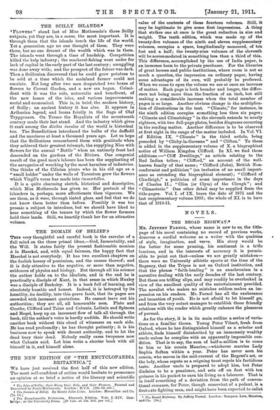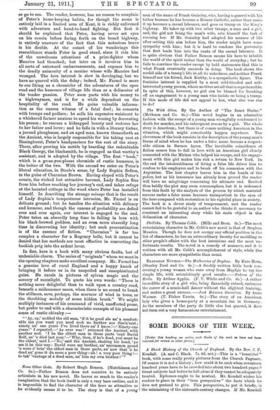NOVELS.
'ilia BROAD HIGHWAY.*
Mn. JEFFERY FARNOL, whose name is new to us, the title. page of his novel containing no record of previous works, deserves a cordial welcome as a writer with the qualities of style, imagination, and verve. His story would be the better for some pruning, his sentiment is a trifle luscious, and in the interests of accuracy it is permis- sible to point out that—unless we are greatly mistaken— there were no University athletic sports at the time of the Regency, that the Tripos is not an Oxford institution, and that the phrase " faith-healing " is an anachronism in a narrative dealing with the early decades of the last century. But these are trifling slips, and may readily be overlooked in view of the excellent quality of the entertainment provided. The novelist who makes no mistakes seldom makes an im- pression on his readers. Mr. Farnol has all the exuberance and incaution of youth. He is not afraid to let himself go, and from the very outset manages to establish those friendly relations with the reader which greatly enhance the pleasures of perusal.
As for the story, it is in its main outline a series of varia, tions on a familiar theme. Young Peter Vibart, fresh from Oxford, where he has distinguished himself as a scholar and athlete, finds himself disinherited by an immensely wealthy uncle unless he complies with an apparently impossible con- dition. That is to say, the sum of half-a-million is to come to him or his cousin Maurice,—whichever marries Lady Sophia Sefton within a year. Peter has never seen his cousin, who moves in the mid-current of the Regent's set, or the lady, whose repute as a reigning toast repels his fastidious taste. Another uncle is prepared to adopt him, but Peter disdains to be a pensioner, and sets off on foot with ten guineas in his pocket to earn his living as a labourer. That is in itself something of a deviation from the path of conven- tional romance, for Peter, though somewhat of a pedant, is a first-rate fighting man, and might have been expected to enlist
• The Broad Highway. By Jeffery Fara& London: Sampson Low, Marston. and Co. [Cs.]
or go to sea. The reader, however, has no reason to complain of Peter's home-keeping habits, for though the scene is entirely laid in a limited area of Kent, it is richly enlivened with adventure and hand-to-hand fighting. But first it should be explained that Peter, having never set eyes on his cousin before faring forth on the broad highway, is entirely unaware of the fact that this notorious bravo is his double. At the outset of his wanderings this resemblance stands. Peter in good stead, since it rids him of the unwelcome attentions of a prize-fighter whom Maurice had thrashed; but later on it involves him in
all sorts of untoward embarrassments, and exposes him to the deadly animosity of a maniac whose wife Maurice had wronged. The love interest is slow in developing, but we have no quarrel with the delay; indeed, Mr. Farnol is more to our liking as a chronicler of the adventures of the open road and the humours of village life than as a delineator of the tender passion. Peter soon parts with his money to a highwayman, and is for a while dependent on the hospitality of the road. He gains valuable informa-
tion as the unseen witness of a fatal duel; he consorts with tramps and pedlars; he sells his expensive waistcoat to a whiskered farmer anxious to speed his wooing by decorating his person ; he rescues a kidnapped beauty and restores her to her father and lover; and he falls in with a literary tinker, a jocund ploughman, and an aged man, known thenceforth as the Ancient, who is largely responsible for his taking root at Sissinghurst, Peter's headquarters for the rest of the story. There, after proving his mettle by bearding the redoubtable Black George, the blacksmith, he is engaged as that worthy's assistant, and is adopted by the village. The first " book," which is a go-as.you-please chronicle of rustic humours, is the better of the two. With the second we enter on Peter's liberal education, in Steele's sense, by Lady Sophia Sefton,
in the guise of Cbarmian Brown. Having eloped with Peter's cousin, the wicked but attractive baronet, Lady Sophia flies from him before reaching her journey's end, and takes refuge at the haunted cottage in the wood where Peter has installed himself. In describing the strange menage that is the result of Lady Sophia's tempestuous intrusion, Mr. Farnol is on delicate ground; but he handles the situation with delicacy and humour, and though the canons of probability are defied
over and over again, our interest is engaged to the end. Peter takes an absurdly long time in falling in love with his black-browed goddess, and an even more absurdly long time in discovering her identity ; but such procrastination is of the essence of fiction. " Charmian." is far too complex a character for a Regency belle, but it cannot be denied that her methods are most effective in converting the bookish prig into the ardent lover.
In fine, here is a book with many obvious faults, but of undeniable charm. The series of " originals " whom we meet in the opening chapters make excellent company. Mr. Farnol has a genuine love of rural England and a happy knack of bringing it before us in its unspoiled and unsophisticated guise. He excels in pictures of sylvan magic and the sorcery of moonlight. To quote his own words: "There is nothing more delightful than to walk upon a country road, beneath a midsummer moon, when there is no sound to break the stillness, save, perhaps, the murmur of wind in trees, or the throbbing melody of some hidden brook." We might multiply instances of his command of vivid, unaffected prose,
but prefer to end with a characteristic example of his pleasant sense of rustic chivalry " '..ky, ay,' nodded the old man, g if it be good ale an' a comfort- able inn you want you need seek no further nor Siss'n'urst ; ninety an' one years I've lived there an' I know.'—' Ninety-one years !' I repeated.= As ever was !' returned the Ancient, with another nod. be the oldest man in these parts 'cept David Relf, an"e died last year.'—' Why, then, if he's dead, you must be the oldest,' said I.—' No,' said the Ancient, shaking his head, 'ye see it be this way : David were my brother, an' uncommon proud 'e were o' bein' the oldest man in these parts, an' now that 'e be dead an' gone it du seem a poor thing—ah ! a very poor thing!— to tak' 'vantage of a dead man, an' him my own brother ! '"











































 Previous page
Previous page